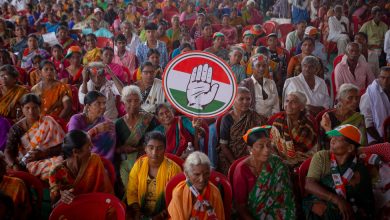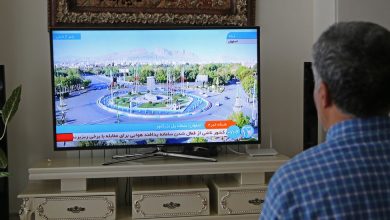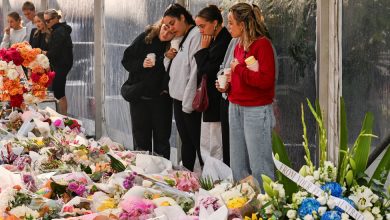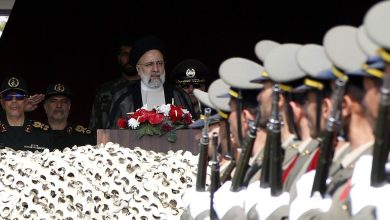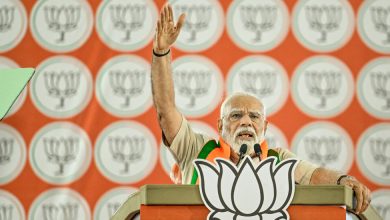Russia’s Mercenary Chief Prepares Ground for a Political Advance
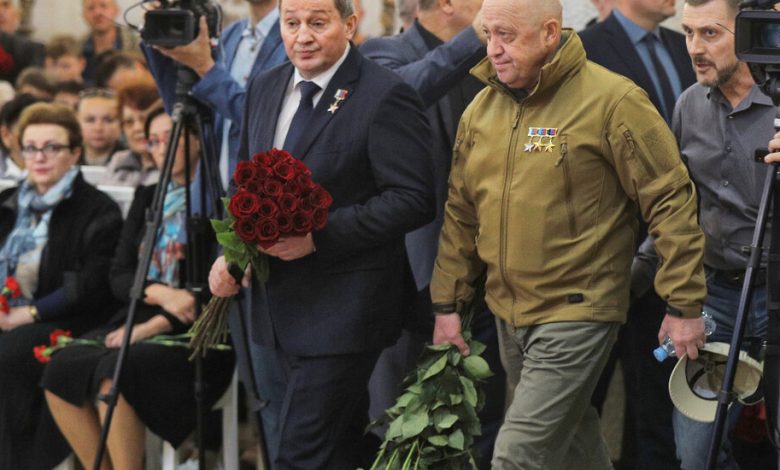
For months, Yevgeny Prigozhin has been Russia’s most public and provocative military leader in Ukraine. When he is not lauding the heroics of his private fighting force from the front lines, he is castigating the Russian generals for starving him of the supplies he needs to finish the work they could not.
Yet now, as his mercenaries struggle to complete a takeover of the eastern city of Bakhmut, Mr. Prigozhin is increasingly turning his attention to Russia’s home front, in what analysts see as attempts to secure a political offramp from the debilitating struggle on the battlefield.
He has said his fighting force, Wagner, will recede to the background after the fight for Bakhmut is over “to gradually reload, to shrink.”He also added, in a video message published on March 11, that Wagner would “transform into an army with ideology, and this ideology will be the struggle for justice.”
Such statements have coincided with other recent announcements suggesting Mr. Prigozhin wants to move past his standing as a military leader and play a larger role in Russian society.
Last week, Wagner, which operated in secrecy as recently as last year, announced that it would open recruitment centers in 42 Russian cities, despite the shrinking of the pool of veterans who have formed the backbone of its forces. Wagner has also recently opened a patriotic youth club, called Little Wagnerite, and hosted an exhibition of pro-war paintings.
The shift coincides with a wave of speculation about Mr. Prigozhin’s political ambitions, as he mixes aggrandizing statements and criticism of Russia’s military with careful navigation of the Russian hierarchy — and respect for President Vladimir V. Putin.
“He sees his future at risk, and he is scrambling to present a place for himself after Bakhmut within the larger war,” said Jack Margolin, a Washington-based expert on Russia’s private military companies.
Mr. Prigozhin has stepped up efforts to demonstrate broad support for Wagner among Russian businessmen, politicians and servicemen.
Last week, he publicly thanked Russia’s minister of industry and an executive at the military-industrial conglomerate Rostec for providing ammunition.
The State of the War
- On the Front Lines: From Kupiansk to Bakhmut, Russian forces are attacking along a 160-mile arc in eastern Ukraine in an intensifying struggle for tactical advantage before possible spring offensives.
- War Crime Cases: The International Criminal Court intends to open two war crimes cases tied to the Russian invasion of Ukraine. The cases accuse Russia of abducting Ukrainian children and of deliberately targeting civilian infrastructure.
- Testing Swiss Neutrality: The Alpine nation makes arms that Western allies want to send to Ukraine. Swiss law bans this, driving a national debate about whether its concept of neutrality should change.
In the last several months, he has also publicized ties with regional officials and nationalist politicians on the fringes of Mr. Putin’s political system, as well as other pro-Russian paramilitary leaders. Wagner has been endorsed by the governor of Russia’s Kursk region, Roman Starovoyt, who in January went on a training course at the group’s base. His region has been a frequent target of Ukrainian drone and missile strikes.
Analysts say these kinds of alliances could serve a prelude for Wagner’s transformation into a political movement that, through recruitment and propaganda campaigns, will aid Mr. Putin’s goal of mobilizing Russian society for a long war. That would allow Mr. Prigozhin to show continued value to the Kremlin even if Wagner suffered battlefield defeats, Mr. Margolin said.
At the same time, Mr. Prigozhin has continued to lambast top military officials for denying his forces critical supplies. On Sunday, he went as far as claiming that ordinary Russian servicemen were bypassing military bureaucracy to donate some of their scarce ammunition to Wagner.
“Such servicemen are the majority,” he said in a follow-up statement on Monday. “It’s just that we missed the moment when unqualified scoundrels and intrigants crushed these humble guys,” he said, using his usual insults for the Russian military general staff.
Russia’s defense and industry ministries and Rostec did not respond to requests for comment.
To some analysts, Mr. Prigozhin’s flurry of boasts and grandiose projections betray a losing struggle against Russia’s top generals.
“I see some desperation here,” said Kirill Rogov, the founder of Re: Russia, an analytical group. “Prigozhin’s positions have noticeably weakened, because they have not taken Bakhmut, they are taking big losses and it’s not clear how they will replenish them.”
The Russian political scientist Dmitri Oreshkin said Mr. Putin had tolerated Mr. Prigozhin’s outspokenness and military autonomy because his grinding advance on Bakhmut had pushed the regular Russian military to show similar success elsewhere in Ukraine.
Mr. Prigozhin has himself framed his battlefield role in similar terms. As Wagner advances, “others must to try to keep up with us to save their face,” he said in a video published on March 4.
Mr. Putin made a bet on Mr. Prigozhin last summer, after Russian forces stumbled from one military disaster to another in the early months of the war.
Wagner was allowed to boost its ranks with tens of thousands of men recruited directly from Russian prisons. Mr. Putin personally issued mass pardons for the enlisted convicts, a departure from legal precedent that showed the scale of Kremlin’s involvement in Mr. Prigozhin’s project at the time.
Thrown into battle with little training, the ex-convicts have gradually exhausted Ukrainian defenses around Bakhmut with waves of costly assaults, allowing the group to take control of the eastern half of the city last week. The Russian forces have failed to make meaningful advances elsewhere.
Throughout the monthslong battle for Bakhmut, Mr. Prigozhin has appeared to relish his role as Russia’s military provocateur, posting profanity-laden accusations of incompetence against senior commanders and insulting the relatives of the defense minister, Sergei K. Shoigu.
Mr. Prigozhin has mocked Mr. Shoigu’s son-in-law for vacationing in Dubai and toying with antiwar sentiment, and last week said Wagner had recruited a namesake of the son-in-law. Social media channels affiliated with Wagner then posted a video of the fighter cursing the son-in-law.
But while Wagner’s progress in Bakhmut has put Russia on the cusp of its first significant victory since last summer, it has also exposed the limits of Mr. Prigozhin’s military strategy and the cost of his attacks on the Russian defense chiefs.
Mr. Prigozhin said last month that Wagner had lost access to Russian jails to recruit fighters; last week he added that he and his representatives had been banned from Russian military facilities. These developments have cut Wagner’s access to recruits and supplies, he said. He has regularly complained about a lack of ammunition.
Ukrainian officials said this month that Wagner had begun to run out of ex-convict fighters, forcing it to use more efficient but scarce professional units in assaults. That amplifies the cost of casualties.
On Sunday, Mr. Prigozhin acknowledged the slow pace of advance in Bakhmut, calling the fighting “difficult,” and saying that Ukrainian defenders continued to “claw at every meter.”
Mr. Prigozhin has also in recent days warned of a looming Ukrainian counteroffensive to liberate the contested city, saying that it could collapse Russia’s entire front line if the regular army does not come to Wagner’s aid.
“He is turning to public opinion and the media because he is no longer able to resolve problems behind the scenes,” said Mr. Margolin, the analyst.
In a written response to questions, Mr. Prigozhin said his plans to turn Wagner into an ideological army referred to the political training of his fighters rather than a broader political project.
“Ideological preparation, in my opinion, will greatly increase the effectiveness of our units,” he said.
Russian and Western analysts said that the volatility of Russian politics and society in wartime made it difficult to predict how successful Mr. Prigozhin might be in transforming himself from a paramilitary leader into a national political figure. He has refashioned his public persona before, turning himself from a convicted fraudster to a catering tycoon, who became known as “Putin’s chef.’’
A national survey by the Moscow-based pollster Russian Field in early February found that 41 percent of respondents approved of Mr. Prigozhin’s role in the war. This makes him one of the country’s more popular wartime leaders, said Artemiy Vvedenskiy, Russian Field’s founder.
But despite Mr. Prigozhin hyperactivity on social media, the same survey found that nearly a third of Russians didn’t know anything about his war effort, showing the limits of internet image-making in a country where most people still get their news from television.
Sergei Markov, a former Kremlin adviser and frequent guest on Russian state television shows, said last month that the Kremlin had directed TV channels to limit the coverage of Mr. Prigozhin to keep his ambitions in check.
But among younger, technology-savvy Russian war supporters, Mr. Prigozhin has been able to stoke patriotic sentiment by building a powerful anti-elite narrative. His messages place the blame for Russia’s military reversals and staggering losses on incompetent and corrupt military commanders, said Mr. Rogov, the political analyst.
Thus far, this narrative has served Mr. Putin’s goals of mobilizing war supporters and pressuring his generals to perform. But it could backfire should Russia’s battlefield fortunes turn catastrophic, Mr. Rogov said, because it was Mr. Putin who appointed the commanders.
In a system that emphasizes public unity, the analyst said, “Prigozhin could become a powerful force of destabilization.”
Alina Lobzina contributed research and Anton Troianovski contributed reporting.
